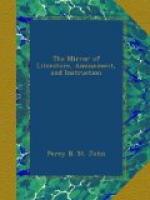The east of Europe contains the Sarmatian and Slavonic tribes, with dark hair and eyes, darker skin than the Germans, and larger limbs than the Celts. This race includes the Russians, Poles, Croats, Slavons, Bohemians, Bulgarians, Cossacks, and other tribes using the Slavonic language.
We trust we shall not give offence to such of our readers as wear the Celtic appearance, if we assume, as undisputed, the general superiority of the Teutonic to the Celtic or Slavonic races in mental acquirements. We believe that the German race are pre-eminent for their sense of order, of law, and of social institutions; and whether they derive these advantages from the east, whence their origin has now been satisfactorily traced, or however they have attained them, we have only to reflect on the civilization introduced by the Saxons into England—on the actual state of the ancient Britons at present inhabiting Wales and the Highlands—and on the terrible disorder and barbarism that reigns in Ireland—to be thankful that the pure Celtic blood has not been allowed to remain unmixed in these islands.
What, then, it will be asked, is the result of these speculations? Are we to conclude that the races of men are essentially different, or that the variations are attributable to the various degrees of moral cultivation that each nation has received? And our answer is, that we are inclined to believe the capacities for improvement of races, as of individuals, to have been differently bestowed by nature; but that none are actually incapable of culture. There is no land, however sterile, that the art of man may not make to produce fruit; but the difficulty and expense of tillage must be in proportion to the intrinsic richness or poverty of the soil. We fear that the soil of the Negroes[3], of the American Indians, and of the Esquimaux, must be laboured at early and late, before it brings forth even an average crop. But we do not despair even here. Still less could we for a moment depreciate the labours of those who are carrying education to the utmost bounds of the earth. The more degraded and stupid the condition of any set of people may be, the more meritorious and thankworthy are those efforts that are made to advance them one point nearer to the heavens—one step above the beasts that perish. The advancement of Hayti, though much overrated, is nevertheless considerable; and we trust that national independence will co-operate there also with the progress of learning, for the increase of happiness and prosperity. A free government, high public spirit, and an eager desire for wisdom, are permanent securities for the welfare of the state, and the happiness of the citizens; and though we cannot control nature, let us endeavour by art to supply what is wanting, where her bounty has been limited; “let us,” in the words of Lord Bacon, “labour to restore and enlarge the power and dominion of the whole race of man over the universe of things!”




